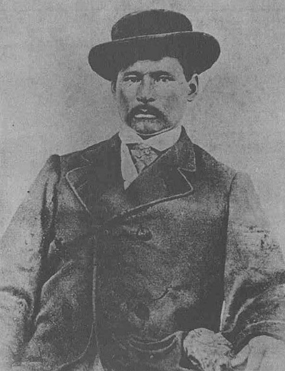 William Q. Thompson
William Q. Thompson
A tribe is unique in all of the world’s political systems in that it goes deeper than political theory and concepts, or even mere political party affiliation. One cannot choose to be a Tribal Citizen. The only way in is through birthright. To be fortunate enough to have been born into a tribe is no small thing. You are part of a larger family, one connected to the land through the millennia, and to each family member, by blood. You will never have to guess who will come to your side against a foe or common enemy.
The call to a leadership role of such a family is not to be ignored. When tribal elders come to you and ask that you accept their nomination, to respond with “No” is not an option. It is an honor to be considered for such a meaningful role, and then to be voted in by a majority of your fellow Tribal Citizens means that you must rise to the responsibility and serve them to the best of your ability. It’s all about the Tribe.
In addition to my role as sub chief, I run all aspects of our tribe’s Air Quality Program: sample collection, data analysis, and policy promulgation used to be three jobs, but due to funding cuts, they now are all the responsibilty of just one person. If you have concerns or worries about your home’s indoor air quality, or the ambient air quality of our reservation in general, do not hesitate to call me at the Air Lab, (207) 817-7340. Leave a message if I do not answer immediately.
 Joseph Attean was born on Christmas Day 1829 and died on the Fourth of July 1870. Joseph died young, only forty years old; however he had accomplished many significant things in his short life. Joseph Attean is considered our last hereditary Chief, obtaining the title at the time of his father’s death and according to ancient traditions. He is also considered the Penobscot Nation's first elected Chief. At the time there was a struggle between two political parties on Indian Island know as the Old Party/New Party System. The old party strived for traditional hereditary chiefs while the new party succumbed to state political pressure and implemented a system of voting to elect chiefs.
Joseph Attean was born on Christmas Day 1829 and died on the Fourth of July 1870. Joseph died young, only forty years old; however he had accomplished many significant things in his short life. Joseph Attean is considered our last hereditary Chief, obtaining the title at the time of his father’s death and according to ancient traditions. He is also considered the Penobscot Nation's first elected Chief. At the time there was a struggle between two political parties on Indian Island know as the Old Party/New Party System. The old party strived for traditional hereditary chiefs while the new party succumbed to state political pressure and implemented a system of voting to elect chiefs.
Joseph Attean probably gained the most notoriety by serving as guide for the author Henry David Thoreau. Henry David Thoreau was an author and a leader in the transcendental movement. In 1853, during Thoreau’s second visit to Maine, he hired Joseph Attean to guide him on his famous moose hunt. Initially Thoreau was full of stereotypes of what he thought a Native American should be, but Attean's character and skill as a guide began the transformation of how Thoreau saw Native Americans.
Joseph Attean's death was on July 4th, 1870 while leading a team of log drivers down the Penobscot River in a bateau, a boat commonly used on river drives. Because of the Independence Day holiday many of John Ross’ crew was in Bangor enjoying the celebrations. Attean and the others were tasked with driving the last of the season’s logs down river.

Attean and Stephen Stanislaus, another Penobscot, were considered the most accomplished and skilled bateau pilots on the Penobscot River. On this day Stanislaus was not in the boat, leaving an unskilled bowman in the front of the boat. Shoving off just above Blue Rock Pitch, on the West Branch of the Penobscot River, the inexperienced bowman failed to get the boat positioned to run Blue Rock Pitch and Grand Pitch Falls. The bateau struck a rock broadside and the current began to tear the boat apart. Many swam for the shore while others stayed with the sinking boat. Attean stayed with the boat trying to rescue those who clung to it. The last anyone saw Joseph Attean alive he was standing in the rear of the bateau, paddle in hand, with water up to his knees desperately trying to save lives as they plunged over Grand Pitch Falls.
They found his body floating in Shad Pond just down river. They removed his log driving boots and hung them on a pine-knot of a tree. According to Maine legend those boots still hang as a tribute to Joseph Attean former Chief of the Penobscot Nation and hero of the Maine woods.
Tomer Sockalexis – Elected New Party governor in 1838, he died in 1870. His lieutenant governor Attean Orson died in Jan. 1874 after having been elected in fall of 1873. In March 1874, at a special election, Sockbeson Swassian was elected lieutenant governor for the remainder of the term.
John Attean was inaugurated Governor for life on September 19, 1816 with John Neptune as Lieutenant Governor. John Attean was born in 1778 and died May 14, 1858. Lt. Gov. John Neptune was born July 27, 1767 and died May 8, 1865 and was probably the son of Colonel John Neptune, Lt. Governor under Gov. Joseph Orono. These two men were born of families that had always held high rank in the tribe. Attean was a direct descendant of Madockawando and of Castine and therefore a close blood relative of Joseph Orono. He was the son of a governor and grandson of a high chief. Neptune was son of a lieutenant governor and descended from a younger branch of the Passamaquoddy, the Neptunes, who furnished chiefs and governors for that tribe for more than six generations from father to son in direct hereditary succession. By the time of his election as lieutenant governor, however, John Neptune’s family had become thoroughly adopted into the Penobscot tribe.
There were differences between Attean and Neptune that embroiled the tribe, eventually splitting it into two rival political factions. The reasons for this split are too involved to detail here, but may be found in Fannie Hardy Eckstorm’s biography of John Neptune or in Professor Jacques Ferland’s publication, "Penobscot Indian Dispossession" in Maine History, volume 43, August 2007. The feud in time became bitter and although John Attean and John Neptune made up their differences, the tribe could not and a discontented faction decided to depose their governor and lieutenant governor and elect new ones. After they had consulted with the chief men and councils of the Passamaquoddy and Malecite [Maliseet] Tribes and invited delegations of those tribes to Old Town, they began the process of deposing the same Penobscot officers they had elected 22 years before. In those days, it was the custom for all the tribes to participate when new chiefs of any of the confederated tribes were elected. It was thus that on Friday, August 31, 1838 the New Party elected as their first governor Tomer Soekalexis and as their first lieutenant governor Attean Orson.
There were now two political parties. The followers of Attean and Neptune refused to acknowledge the newly elected men as their leaders and firmly adhered to the old leaders of the tribe. From then on, this faction was called the Old Party. The Old Party maintained that Attean and Neptune had been elected according to the ancient custom of the tribe “for life.” The New Party just as strongly maintained that Attean and Neptune had forfeited their rights to their offices by their actions, and thus the tribe had the right, and the duty, to get rid of them and elect new ones. Several times the Maine legislature tried to get the tribe to work through their differences, but in vain. On the death of John Attean in 1858, the Old Party promptly chose his son, Joseph Attean, as his successor, and he was duly inaugurated by them, according to ancient Penobscot custom, for life. On the death of Lt. Governor John Neptune in 1865, his son Saul Neptune was named lieutenant governor in his stead by the Old Party.
The New Party Governor Tomer Sockalexis died at the age of 68 on Sept. 30, 1870, and on Jan. 12, 1874, Attean Orson, the New Party lieutenant governor, died. Since Joseph Attean was drowned in 1870 and the first Old Party governor we have after this date was elected in Sept. 1874, we are probably missing at least two governors in our list, an Old Party man elected in 1871 and 1873 and New Party governors for 1870 and 1874. It seems that in 1865 the parties agreed to alternate elections. and that the first year, the Old Party chose Joseph Attean to govern both parties. After he died, the New Party elected Tomer Sockalexis.
